Sonapur: In the early hours of Thursday, Garima Saikia Garg, wife of the music legend Zubeen Garg, visited the cremation site in Sonapur along with his sister Palmee Borthakur, noted actor Pranjal Saikia, and a team of architects to assess the feasibility of the proposed design for Zubeen Garg Kshetra.
Prominent personalities including Sudarshan Thakur, Pulak Banerjee, Anuradha Sharma Pujari, Tarali Sharma, Partha Sarathi Mahanta, and Biren Singh were also present during the inspection. The visit followed the team’s detailed proposal presentation at Srimanta Sankaradeva Kalakshetra in Guwahati on Wednesday evening.
According to sources, about 10 bighas of land have been earmarked for the construction of the Samadhi Kshetra. However, local residents have expressed readiness to contribute an additional 30–40 bighas of land to develop the site, noting that most of the surrounding area belongs to the Assam government and some portions to Minister Ashok Singhal.
“We are willing to provide 30–40 bighas of land for Zubeen’s Samadhi Kshetra. We only request that the government develop our community cremation ground within the same area. This would be our humble contribution to a noble cause,” said one of the villagers.
Speaking to reporters, Garima Saikia Garg shared that the memorial would go beyond a conventional tribute site. “Zubeen Kshetra will be a place deeply connected with nature — a space where one can feel his presence and spirit. It will be technologically and digitally advanced, allowing future generations to learn about his life and legacy,” she said.
Garima stressed that the memorial’s surroundings should remain free from commercialisation, urging that no resorts or business establishments be permitted nearby. “This is meant to be a peaceful, cultural, and natural space — not a commercial hub,” she added.
She acknowledged that the initially allotted land might not suffice and thanked the locals for their overwhelming support. “The people here have offered us more land with open hearts. We’ll also help develop their cremation site alongside the Kshetra,” she assured.
Garima further revealed that the Karbi community in the area had discovered a nine-foot living stone and were searching for a larger one to install as a monolith in Zubeen’s memory.
Reflecting on Zubeen’s deep bond with Sonapur, she recalled that he had once done a photoshoot in the area. “There is a deeper connection here — I can feel it,” she said.
Growing emotional ahead of the release of Roi Roi Binale, Zubeen’s last film, Garima said, “Zubeen’s dream is finally coming true, though it hurts that he isn’t here to see it. I urge everyone who loved him to support this film and keep his legacy alive.”
She also revealed that a museum dedicated to Zubeen Garg’s music and memorabilia is under development and that several initiatives will follow to continue his legacy.
Garima expressed heartfelt gratitude to the Assam government for its decision to contribute 9% of the GST share from Roi Roi Binale to the Kalaguru Foundation, established by Zubeen himself.
“Through the Kalaguru Foundation, Zubeen supported children’s education, social causes, and community welfare. We will continue his mission and keep his spirit alive through his work,” Garima concluded.

